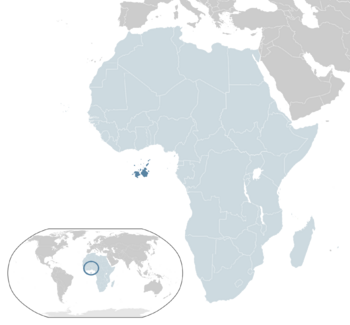Alanweke
This article is incomplete because it is pending further input from participants, or it is a work-in-progress by one author. Please comment on this article's talk page to share your input, comments and questions. Note: To contribute to this article, you may need to seek help from the author(s) of this page. |
Republic of Alanweke Republic nke Alanweke (Igbo) | |
|---|---|
| Motto: De hoc ortu solis (Latin) On the rising sun | |
| Anthem: Chineke na-agọzi Africa (Igbo) God bless Africa | |
 Location of Alanweke (Dark Blue) in the African Union (light blue) | |
| Capital and largest city | Nkugwu |
| Official languages | Igbo English Igbo sign-language Ijaw |
| Recognised national languages | Ewe |
| Ethnic groups (2018) | 48.6% Igbo 35.8% Ijaw 9.8% Ewe 3.5% Ogoni 2.3% Other |
| Religion | 72.5% Christianity 14.7% Traditional faiths 7.4% Islam 3.9% No religion 1.5% Other |
| Demonym(s) | Nwekese |
| Government | Unitary Semi-Presidential constitutional republic |
• President | Okeli Okparra |
• Prime Minister | Uchie Chimaijem |
| Legislature | Parliament |
| Establishment | |
• Dominion | 15 August 1956 |
• Republic | 1 January 1962 |
• Military Coup | 11 November 1962 |
• Current Constitution | 28 August 2017 |
| Area | |
• | 120,150 km2 (46,390 sq mi) (98th) |
| Population | |
• 2020 estimate | 21,021,837 (58th) |
• 2018 census | 19,764,675 |
• Density | 164.5/km2 (426.1/sq mi) |
| GDP (PPP) | estimate |
• Total | $288 Billion |
• Per capita | $13,726 |
| GDP (nominal) | estimate |
• Total | $101 Billion |
• Per capita | $4,837 |
| Gini (2020) | 45.3 medium |
| HDI (2020) | medium |
| Currency | Nwekese Dollar (NKD) |
| Time zone | UTC (GMT) |
| Date format | dd-mm-yyyy |
| Driving side | left |
| Calling code | +219 |
| Internet TLD | .nk |
Alanweke, officially the Republic of Alanweke (Igbo: Republic nke Alanweke) is an Island country in the Gulf of Guinea, off the southern coast of Western Africa. The country consists of dozens of islands although the largest are Nnukwuti and Ndandati. The country has an area of 120,150 km2 (46,390 sq mi). Alanweke shares maritime borders with Ghana, Cote d'Ivoire, Togo, Benin and Nigeria.
The first permanent state in Alanweke dates back to the 12th century, Agu State. Throughout Alanweke's history there have been several kingdoms and states. The most notable states being Alanwoye and Alanweke empire. The Alanweke empire was the first state to unify all of the islands and ruled from 1488 to 1547. Starting with the Portuguese empire in the late 15th century, several European powers sought to gain trading rights on the island due to it's geographic location in the Gulf of Guinea. The British empire were successful in gaining a monopoly on trade in Alanweke and set up their first port in 1547 which was named Port Elizabeth.
The British established total control over the archipelago in the mid 18th century. The islands were merged into one colonial Territory called South Guinea with it's capital in Port Elizabeth. In 1905, a rebellion amongst the native population began. The rebels were able to capture Port Elizabeth in 1906 and the city was destroyed. The rebellion was put down in 1906 and strict new laws were implemented over the native population. During World War 2 the colony was an important staging ground for naval operations in the Atlantic Ocean. In 1956, the Dominion of Alanweke was established and in 1962 full independence was declared. Shortly after this, a military coup against the President occurred and from 1962 to 2016 the country was a Military dictatorship in 2017, the military regime ended following negotiations between the opposition and the military. The London Agreement established a Democracy in the country.
Alanweke is a Unitary Semi-Presidential Republic. Alanweke's economic prosperity and recent transition to Democracy have made it a Regional power in West Africa. Alanweke is a member of the African Union, the Economic Community of West African States (ECOWAS), the Group of 24, the Non-aligned Movement and the Commonwealth of Nations
Etymology
The Etymology of the name Alanweke translates to "Land of Nweke" referring to Nweke Diji, the first ruler of a unified state on the Guinea Archipelago. The name has been used at various points throughout the country's history. Alanweke was referred to as Meriagha during British colonial rule. This comes from an earlier state in the north of the Archipelago that first came in contact with the British.

